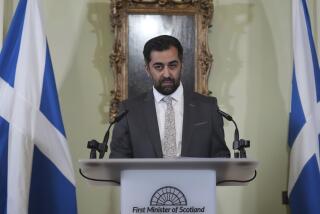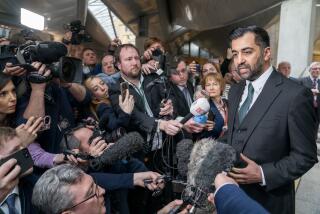Scots to Get First Parliament in 300 Years
- Share via
EDINBURGH, Scotland — With prideful nationalism, Scots on Thursday voted for self-rule and the creation of their first Parliament in three centuries.
Official results today from a national referendum echoed the universal predictions of polls and pundits: a landslide “Yes” for the Parliament. There was also strong support for a second “Yes”--to give the Parliament tax-making powers.
With results from all 32 districts counted this morning, the vote for Parliament was 74% in favor, and the vote for giving the body taxing authority was 63% in favor. Voter turnout was 60%.
The 129-member Parliament, a beacon-in-the-making for about 5 million Scots with a deep-seated sense of nationhood, will have powers similar to those of American state legislatures.
Scotland will remain an integral part of the United Kingdom, but the Parliament will restore local legislative authority to the country for the first time since English and Scottish parliaments merged in 1707.
Scotland has been ruled by lawmakers in London ever since, so creation of the new Parliament represents a radical departure for a centrally administered nation where government now skips directly from the British Parliament to local city and village councils.
The Labor Party government of Prime Minister Tony Blair sponsored Thursday’s referendum, saying a Scottish Parliament will bring government closer to a region that historically has complained of getting short shrift from a far-off, otherwise-interested Parliament in London.
“The Highlands will get a better deal. We will be heard by a Scottish Parliament as we were never heard at Westminster,” said Peter Peacock, who heads the local government in the remote, sparsely populated Highlands from a base in Inverness.
Opponents of the new Scottish legislature, including the powerless Conservative Party and much of Scotland’s business establishment, say the devolution is unnecessary, expensive and dangerous, a first fatal step down a slippery slope toward independence for Scotland and destruction of the United Kingdom.
“We are entering a motorway without an exit--except to the breakup of the United Kingdom,” warned Tam Dalyell, a senior Scottish member of Parliament in London who broke with his Labor Party over the referendum.
In Blair’s strategy, the new Parliament is less a matter of emotion or destiny than a safety valve contrived to take the steam out of independence sentiment for long years to come, reinforcing cohesion of a united kingdom of England, Scotland, Wales and Northern Ireland.
The date assigned for the vote, chosen by Blair’s image-savvy advisors, was not without good reason--Sept. 11 happened to be the 700th anniversary of the Battle of Stirling Bridge, in which Scottish forces led by William Wallace routed the English.
The number of patriotic Scots visiting the battle monument at Stirling has tripled since release of “Braveheart,” Hollywood’s version of Wallace’s life.
Minority Scottish nationalists who seek independence were tactical junior partners in the “Yes-Yes” campaign led by Labor and their Liberal Democrat allies.
Labor has 56 of the 72 Scottish seats in the British Parliament elected in the Blair landslide in May. The Liberal Democrats have 10, and Scottish Nationalists six.
The Conservatives, who ruled Britain for 18 years until Blair’s victory and had 11 Scottish seats, now have not a single member of Parliament from either Scotland or Wales, which will vote next week in a referendum for a regional assembly with more limited authority than in Scotland.
Long a feisty independent kingdom, Scotland has retained its own legal and educational systems and its own establishment church since the 18th century merger of the English and Scottish parliaments. That is described as a union but amounted, in modern terms, to a takeover of the Scottish legislature by more powerful Westminster.
The Scots’ new Parliament will be born under legislation to be submitted by Blair later this year to the British Parliament, where its approval is certain.
Elections will be called for 1999, with the Scottish Parliament making its ceremonial first sitting in 2000.
As outlined in government documents prepared for the referendum, the Scottish Parliament will oversee health service, education and training, local government, housing, economic development, transportation, law and order, the environment, farming and fishing, and sports and the arts.
The British Parliament will retain authority over foreign and defense policy, economic, monetary and employment policies, social security and sensitive areas such as broadcasting, gambling and abortion.
Under current proposals, the new Parliament seated in Edinburgh will continue to rely on a yearly grant for Scotland from the British Treasury, now about $22 billion, but could raise or lower taxes up to 3% of the national figure established in London.
Ending a political truce while Britain mourned Princess Diana, Blair barnstormed among the Scots this week, urging people “to vote for a new and modern settlement for Scotland that allows Scottish people to take decisions closer to them, closer to their priorities.”
Blunt as ever, Margaret Thatcher came to Scotland to speak for Conservative forces whose “No-No” campaign never really got off the ground.
“A majority vote won’t make something that is fundamentally wrong right,” the former prime minister said.
(BEGIN TEXT OF INFOBOX / INFOGRAPHIC)
Scotland’s Referendum
Scots voted Thursday to establish their own Parliament while still remaining part of the United Kingdom.*
Land and people
5.1 million
30,420 square miles
****
History
1603: Scotland and England share the same monarchy when James VI of Scotland succeeds Queen Elizabeth I.
1707: Joined with England under a single Parliament in London. Scotland retains a separate legal and educational system. The Presbyterian Church is the established faith.
1979: Scotland and Wales fail to elect separate assemblies in referendums.
****
What will change
A 129-member assembly will be seated in Edinburgh with power to pass laws and assess some taxes. It will have sole authority over health, education, local government, housing, police, courts, transportation, agriculture, sports and arts.
****
What won’t change
Scotland will continue to elect lawmakers to the 659-member House of Commons in London.
The London government will continue to be responsible for foreign affairs, defense, most tax and economic decisions.
* England, Scotland, Wales and Northern Ireland form the United Kingdom.
More to Read
Sign up for Essential California
The most important California stories and recommendations in your inbox every morning.
You may occasionally receive promotional content from the Los Angeles Times.













